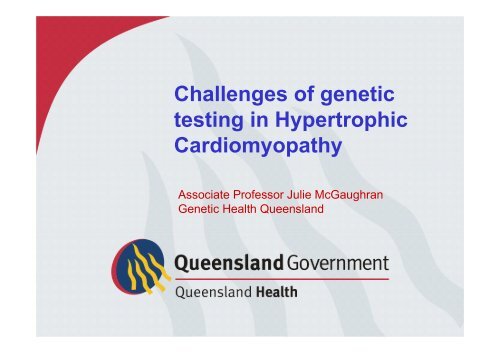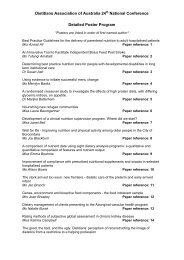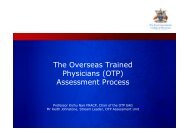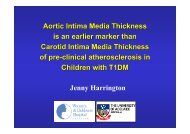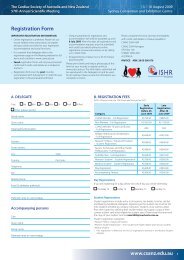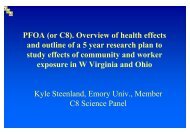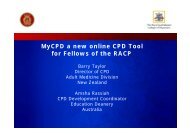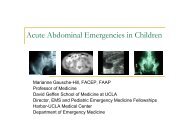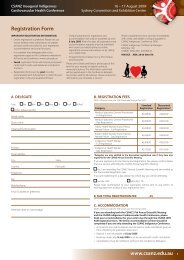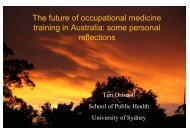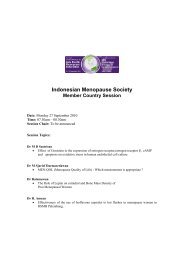Challenges of genetic testing in Hypertrophic Cardiomyopathy
Challenges of genetic testing in Hypertrophic Cardiomyopathy
Challenges of genetic testing in Hypertrophic Cardiomyopathy
You also want an ePaper? Increase the reach of your titles
YUMPU automatically turns print PDFs into web optimized ePapers that Google loves.
<strong>Challenges</strong> <strong>of</strong> <strong>genetic</strong><strong>test<strong>in</strong>g</strong> <strong>in</strong> <strong>Hypertrophic</strong><strong>Cardiomyopathy</strong>Associate Pr<strong>of</strong>essor Julie McGaughranGenetic Health Queensland
Cardiac Genetics Cl<strong>in</strong>ic• 10 year research <strong>in</strong>terest <strong>in</strong> cardiomyopathies• Awareness <strong>of</strong> improved <strong>test<strong>in</strong>g</strong>• Need for formalised family follow up• Developed comb<strong>in</strong>ed cl<strong>in</strong>ic from Feb 07
<strong>Hypertrophic</strong> cardiomyopathy• Autosomal dom<strong>in</strong>ant• 1 <strong>in</strong> 500• Commonest cause <strong>of</strong> sudden cardiac death<strong>in</strong> <strong>in</strong>dividuals
AttendancePatient Attendees200150100500Year 2007 Year 20082007: 70 patients2008: 147 patients
Genetic <strong>test<strong>in</strong>g</strong>50403045 diagnostic18 predictive20100DiagnosticPredictive
Test<strong>in</strong>g issues• Many genes, many mutations• Availability• Cost• More than one mutation• Phenotype/genotype correlation
Availability• Specialised tests• Useful for centres to develop excellence• Not available <strong>in</strong> Australia• Currently send to Denmark lab (StatensInstitute)
Test<strong>in</strong>g• 11 genes screened• Family history: 60% chance f<strong>in</strong>d<strong>in</strong>g mutation• No family history: 30% chance• Queensland to date; 62% mutation detection
Cost• No Federal fund<strong>in</strong>g for vast majority <strong>of</strong><strong>genetic</strong> tests• Variable access to state fund<strong>in</strong>g• Currently $2000/screen• Funded by state <strong>in</strong> Queensland (so far)
Cost <strong>of</strong> screen<strong>in</strong>g• On basis <strong>of</strong> guidel<strong>in</strong>es, if screen from 10-60 years <strong>in</strong>4 at risk family members• M<strong>in</strong>imal costs for cl<strong>in</strong>ical assessment, echo and ECG= about $30000• To test 4 at risk relatives if mutation known= $1000
More than one mutation• Number <strong>of</strong> studies shown people with 2mutations <strong>in</strong> same gene or different genes• Interpretation difficult with<strong>in</strong> families• Could be related to cl<strong>in</strong>ical course ie may bemore severe
Genotype/phenotype correlation• Can the gene mutation predict cl<strong>in</strong>icalcourse?• Can it aid management?• Generally, no
MYH7: V606M mutation“Benign mutation”Apparently unaffected 70s?ICDICD 12y
Family Test<strong>in</strong>gICDTested negative for familial mutation twiceHas mild hypertrophy
M familyOut <strong>of</strong> hospital arrestSignificant HCMAll family assessedand cl<strong>in</strong>ically normal
After mutation <strong>test<strong>in</strong>g</strong>...Management <strong>of</strong> mutation positive, phenotype negative?
Consent• Need to expla<strong>in</strong> limitations <strong>of</strong> <strong>test<strong>in</strong>g</strong>• Possibility <strong>of</strong> 2 mutations and family studiesnecessary• Be aware <strong>of</strong> consequences ie if asymptomaticwill be then be considered “affected”• Issues with children
Future developments• Ongo<strong>in</strong>g development Australasianguidel<strong>in</strong>es• Consider fund<strong>in</strong>g and develop <strong>test<strong>in</strong>g</strong> formore conditions with appropriate<strong>in</strong>terpretation• Expand cl<strong>in</strong>ic eg FH• Collaboration and research; forensicpathology, coroner
To f<strong>in</strong>ishCous<strong>in</strong> with HCM <strong>in</strong> Holland82 years, normal exam<strong>in</strong>ation
Thank you?
Genes Screened• MYH7• MYBPC3• MYL2• MYL3• TNNT2• TPM1• ACTC• TNNI3• CSRP3• TCAP• Promoter and cod<strong>in</strong>g regions PLN
Children• Not able to give <strong>in</strong>formed consent• Issues <strong>of</strong> confidentiality• Pros v cons• Discrim<strong>in</strong>ation• Loss <strong>of</strong> opportunity• When to test• Why?


